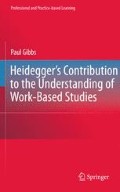Abstract
Having discussed the workplace researcher I now want to linger a while on the workplace learning offering two short and one long vignettes to illustrate Heidegger’s approach before closing. To recap the premise of this analysis is that we do not first encounter something in terms of its attributes, for example, a set of buttons with letters on them and a screen. Instead, we directly encounter computers in the same way as we encounter as meaningful entities such as desks or lathes, rather than as objects deconstructed to their individual attributes. This is not a phenomenological but a physical deconstruction. That is, to investigate human activity we encounter meaningful things in the first instance. This meaningfulness fits in with our practices for using them. Simply put, without practices in which items of equipment, gaining their meaning from our familiarity with the totality of equipmental references, were incorporated, we would encounter them as mere artefacts.
The work as works sets up a world… . But what does the work set forth? We come to know about this only when we explore what comes to the fore and it customarily spoken of as the making of production of works.
(Heidegger, The Origin of the Work of Art, 1975a, p. 44)
Access this chapter
Tax calculation will be finalised at checkout
Purchases are for personal use only
References
Barnett, R. (1997). Higher education: A critical business. Maidenhead: The Society for Research into Higher Education and Open University.
Bryson, C. (2004). What about the workers? The expansion of higher education and the transformation of academic work. Industrial Relations Journal, 35(1), 38–57.
Coulter, D. (2002). What counts as action in educational action research? Educational Action Research, 10(2), 189–206.
Dearlove, J. (1997). The academic labour process: From collegiality and professionalism to managerialism and proletarianisation? Higher Education Review, 30(1), 56–75.
Dreyfus H. L., & Dreyfus, S. E. (2004). The ethical implications of the five-stage skill-acquisition model. Bulletin of Science Technology Society, 24, 251–264.
Enders, J., & Teichler, U. (1997). A victim of their own success? Employment and working conditions of academic staff in comparative perceptive. Higher Education, 34(3), 347–372.
Eraut, M. (2004). Informal learning in the workplace. Studies in Continuing Education, 26(2), 247–273.
Gur-Ze’ev, I. (2007). Beyond the modern-postmodern struggle in education: Toward counter-education and enduring improvisation. Rotterdam: Sense Publishers.
Halsey, A. H. (1992). The decline of donnish dominion. Oxford: Oxford University Press.
Heidegger, M. (1962) [1927]. Being and time (J. Macquarrie & E. Robinson, Trans.). Oxford: Blackwell.
Kogan, M. (2000). Higher education communities and academic identity. Higher Education Quarterly, 54(3), 207–216.
Kolsaker, A. (2008). Academic professionalism in the managerialist era: A study of English universities. Studies in Higher Education, 35(5), 513–525.
Macfarlane, B. (2005). The disengaged academic: The retreat from citizenship. Higher Education Quarterly, 59(4), 296–312.
McPherson, I. (2005). Reflexive learning: Stages towards wisdom with Dreyfus. Educational Philosophy and Theory, 37(5), 705–718.
Nielsen, K. (2007). Aspects of a practical understanding: Heidegger at the workplace. Scandinavian Journal of Educational Research, 51(5), 455–470.
Nixon, J. (2001). Towards a new academic professionalism: A manifesto of hope. British Journal of Society of Education, 22(2), 227–244.
Pigrum, D. (2007). The ‘ontopology’ of the artist’s studio as workplace: Researching the artist’s studio and the art/design classroom. Research in Post-Compulsory Education, 12(3), 291–307.
Piper, D. W. (1994). Are professors professional? The organisation of university examinations. London: Jessica Kingsley.
Wenger, E. (1998). Communities of practice: Learning, meaning and identity. New York: Cambridge University Press.
Willmott, H. (1995). Managing the academics—Commodification and control in the development of university education in the UK. Human Relations, 48(9), 993–1027.
Winch, C., & Clarke, L. (2003). ‘Front-loaded’ vocational education versus lifelong learning. A critique of current UK Government policy. Oxford Review of Education, 29(2), 239–252.
Author information
Authors and Affiliations
Corresponding author
Rights and permissions
Copyright information
© 2011 Springer Science+Business Media B.V.
About this chapter
Cite this chapter
Gibbs, P. (2011). Doing Phenemological Research in the Workplace. In: Heidegger’s Contribution to the Understanding of Work-Based Studies. Professional and Practice-based Learning, vol 4. Springer, Dordrecht. https://doi.org/10.1007/978-90-481-3933-0_12
Download citation
DOI: https://doi.org/10.1007/978-90-481-3933-0_12
Published:
Publisher Name: Springer, Dordrecht
Print ISBN: 978-90-481-3932-3
Online ISBN: 978-90-481-3933-0
eBook Packages: Humanities, Social Sciences and LawEducation (R0)

